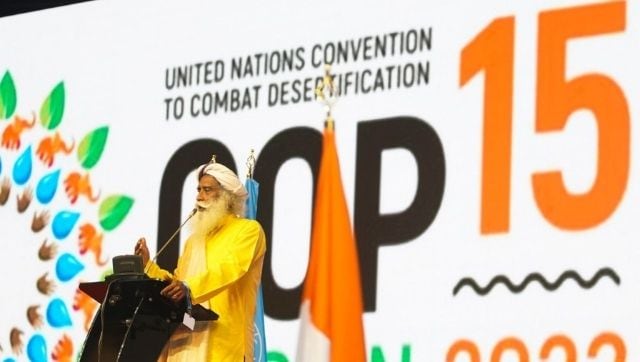
Overarching objective of ensuring a minimum 3-6 per cent organic content for agricultural soil can be achieved with a pragmatic three-pronged strategy of inspiration, incentives, and appropriate disincentives, Sadhguru said
New Delhi: Founder of Isha Foundation, Sadhguru stressed the need to develop superior quality foodgrains grown from soil having 3-6 per cent organic content-level, and said ensuring a minimum of 3-6 per cent of such content in agriculture soil would make the soil vibrantly living and sustainably thriving.
Addressing representatives from 197 nations at the 15th session of the Conference of Parties (COP15) to the United Nations Convention to Combat Desertification (UNCCD) at Abidjan in Ivory Coast, he said the overarching objective of ensuring a minimum 3-6 per cent organic content for agricultural soil can be achieved with a pragmatic three-pronged strategy of inspiration, incentives, and appropriate disincentives.
“The gathering of all the countries of the world at the COP15 summit in Cote d’Ivoire is a key opportunity to redouble governmental policy efforts aimed at reversing the degradation of agricultural land all around the world, and in so doing bring humanity back from the very brink of Soil extinction,” a release quoted him as saying.
To save soil at large scale we need to shape a “deep-rooted people’s movement,” he stated. He added that there are many scientific nuances on how to handle the problem of land degradation in different types of soil conditions, in various agro-climatic zones, and in the differing contexts of cultural and economic traditions.
Talking about pragmatic three-pronged strategy, Sadhguru stated, “We need to make it aspirational for farmers to achieve the minimum threshold of 3-6 per cent organic content by providing attractive incentives for getting to this threshold. Such incentives would create an aspirational race amongst farmers. It should be noted that there should be a phased program of implementation over a number of years – with the first phase being that of providing inspiration, followed by a second phase of providing incentives, and eventually having a third phase with some appropriate disincentives.”
He added, “We need to facilitate carbon credit incentives for farmers. The current processes for farmers to avail of carbon credit benefits are far too complex – and therefore need significant simplification.”
Thereafter, we need to develop a mark of superior quality for food grown from soils that have the target 3-6 per cent organic content level, he noted.
“Alongside doing this, we should also clearly articulate the various health, nutritional, and preventive health benefits of consuming such foods. As a result of this
initiative, people would be more healthy, more productive, and more resilient – thereby leading to gains in man-days, and a lower stress on our health care systems. It is therefore evident that such a mark of superior quality food would have far more meaning than the current system of just trying to distinguish between so called ‘organic’ produce from ‘nonorganic’ one,” he added.
(With inputs from PTI)
Read all the Latest News, Trending News, Cricket News, Bollywood News,
India News and Entertainment News here. Follow us on Facebook, Twitter and Instagram.



)



More News
Himachal Pradesh Assembly By-Elections: Congress Announces Candidates For 3 Seats
From inane to evocative, the ‘free & colourful’ world of symbols | India News – Times of India
3 Things You must know about JEE Main 2025